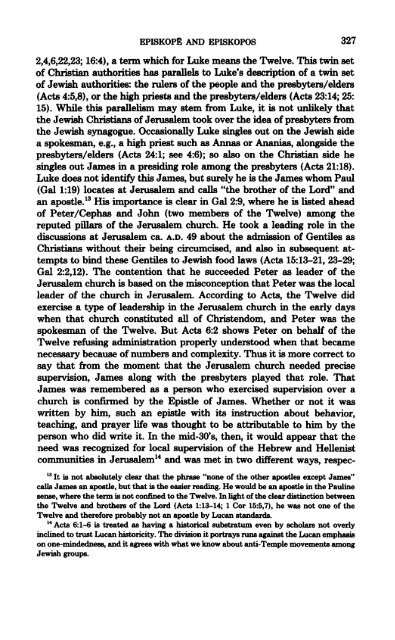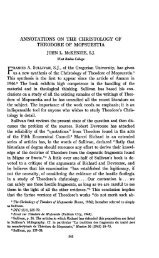episkopë and episkopos: the new testament evidence - Theological ...
episkopë and episkopos: the new testament evidence - Theological ...
episkopë and episkopos: the new testament evidence - Theological ...
You also want an ePaper? Increase the reach of your titles
YUMPU automatically turns print PDFs into web optimized ePapers that Google loves.
EPISKOPË AND EPISKOPOS 327<br />
2,4,6,22,23; 16:4), a term which for Luke means <strong>the</strong> Twelve. This twin set<br />
of Christian authorities has parallels to Luke's description of a twin set<br />
of Jewish authorities: <strong>the</strong> rulers of <strong>the</strong> people <strong>and</strong> <strong>the</strong> presbyters/elders<br />
(Acts 4:5,8), or <strong>the</strong> high priests <strong>and</strong> <strong>the</strong> presbyters/elders (Acts 23:14; 25:<br />
15). While this parallelism may stem from Luke, it is not unlikely that<br />
<strong>the</strong> Jewish Christians of Jerusalem took over <strong>the</strong> idea of presbyters from<br />
<strong>the</strong> Jewish synagogue. Occasionally Luke singles out on <strong>the</strong> Jewish side<br />
a spokesman, e.g., a high priest such as Annas or Ananias, alongside <strong>the</strong><br />
presbyters/elders (Acts 24:1; see 4:6); so also on <strong>the</strong> Christian side he<br />
singles out James in a presiding role among <strong>the</strong> presbyters (Acts 21:18).<br />
Luke does not identify this James, but surely he is <strong>the</strong> James whom Paul<br />
(Gal 1:19) locates at Jerusalem <strong>and</strong> calls "<strong>the</strong> bro<strong>the</strong>r of <strong>the</strong> Lord" <strong>and</strong><br />
an apostle. 13 His importance is clear in Gal 2:9, where he is listed ahead<br />
of Peter/Cephas <strong>and</strong> John (two members of <strong>the</strong> Twelve) among <strong>the</strong><br />
reputed pillars of <strong>the</strong> Jerusalem church. He took a leading role in <strong>the</strong><br />
discussions at Jerusalem ca. A.D. 49 about <strong>the</strong> admission of Gentiles as<br />
Christians without <strong>the</strong>ir being circumcised, <strong>and</strong> also in subsequent attempts<br />
to bind <strong>the</strong>se Gentiles to Jewish food laws (Acts 15:13-21, 23-29;<br />
Gal 2:2,12). The contention that he succeeded Peter as leader of <strong>the</strong><br />
Jerusalem church is based on <strong>the</strong> misconception that Peter was <strong>the</strong> local<br />
leader of <strong>the</strong> church in Jerusalem. According to Acts, <strong>the</strong> Twelve did<br />
exercise a type of leadership in <strong>the</strong> Jerusalem church in <strong>the</strong> early days<br />
when that church constituted all of Christendom, <strong>and</strong> Peter was <strong>the</strong><br />
spokesman of <strong>the</strong> Twelve. But Acts 6:2 shows Peter on behalf of <strong>the</strong><br />
Twelve refusing administration properly understood when that became<br />
necessary because of numbers <strong>and</strong> complexity. Thus it is more correct to<br />
say that from <strong>the</strong> moment that <strong>the</strong> Jerusalem church needed precise<br />
supervision, James along with <strong>the</strong> presbyters played that role. That<br />
James was remembered as a person who exercised supervision over a<br />
church is confirmed by <strong>the</strong> Epistle of James. Whe<strong>the</strong>r or not it was<br />
written by him, such an epistle with its instruction about behavior,<br />
teaching, <strong>and</strong> prayer life was thought to be attributable to him by <strong>the</strong><br />
person who did write it. In <strong>the</strong> mid-30's, <strong>the</strong>n, it would appear that <strong>the</strong><br />
need was recognized for local supervision of <strong>the</strong> Hebrew <strong>and</strong> Hellenist<br />
communities in Jerusalem 14 <strong>and</strong> was met in two different ways, respec-<br />
13 It is not absolutely clear that <strong>the</strong> phrase "none of <strong>the</strong> o<strong>the</strong>r apostles except James"<br />
calls James an apostle, but that is <strong>the</strong> easier reading. He would be an apostle in <strong>the</strong> Pauline<br />
sense, where <strong>the</strong> term is not confined to <strong>the</strong> Twelve. In light of <strong>the</strong> clear distinction between<br />
<strong>the</strong> Twelve <strong>and</strong> bro<strong>the</strong>rs of <strong>the</strong> Lord (Acts 1:13-14; 1 Cor 15:5,7), he was not one of <strong>the</strong><br />
Twelve <strong>and</strong> <strong>the</strong>refore probably not an apostle by Lucan st<strong>and</strong>ards.<br />
14 Acts 6:1-6 is treated as having a historical substratum even by scholars not overly<br />
inclined to trust Lucan historicity. The division it portrays runs against <strong>the</strong> Lucan emphasis<br />
on one-mindedness, <strong>and</strong> it agrees with what we know about anti-Temple movements among<br />
Jewish groups.
















